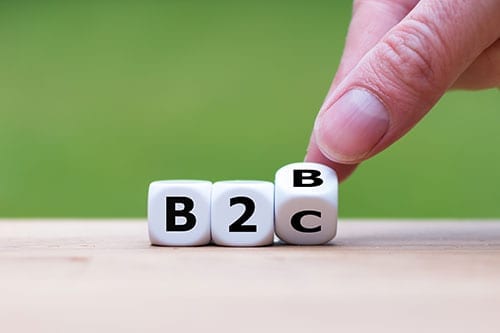3 Differences Between B2C and B2B
This is the greatest country in the world to start and grow a business. The variety of businesses, whether selling products, services, or both, is dizzying. Opportunity is enormous, but business isn’t easy, and it’s far from simple. For success, the business owner must understand their customers and their needs and wants. Then they must figure out how to satisfy those needs, and how to do so in competition with others and at a price that customers are willing to pay.
The type of business you’re in will determine whether you’re considered a B2C, Business to Consumer, or B2B, Business to Business, owner. There are characteristics common to both, such as understanding your customers, their requirements, the price they’re willing to pay, etc. However, there are some very distinctive differences between the two business categories.
-1- Customer Focus
The consumer tends to have a very narrow focus on their reason for dealing with your business. Maybe they want a great burger, or they need their home cleaned, or their car repaired, or maybe their clothing cleaned. The B2C business focuses on that need/requirement, and they try to provide the very best burger, cleaning, or repair experience at a competitive price.
The business customer also has a narrow focus, which is doing business with you in order to further their business goals. But the relationship and the requirements have an extension to the value of your products or services as it translates to the business customers’ value to their customers. Is what you’re selling going to improve your business customers’ value to their customers, or is it going to improve profitability through streamlining operations or provision of services to those customers?
-2- Value Component
The value of a product or service is related to the cost coupled with the requirements and satisfaction of the customer. If the price is justified by the value to the customer, a sale can result. When it comes to that burger, perhaps there are several competitors that offer a similar product, just as juicy and with all of the condiments, but maybe you can upsize their fries or offer some other inducement to get the customers in the door. The great news for this type of product or a consumer service is that offerings and value inducements are often easy to change regularly to induce customers to buy.
Things are a little more complicated when it comes to B2B. There is a leveraging feature that often requires that you be able to show your customer how your product or service inducement will improve their ability to serve their customer or reduce their costs without sacrificing, or even improving, quality. No matter how good your product or service, often you’ll only get a sale to a business if you’re able to show how they can leverage it for their needs.
-3- Ancillary Considerations
The consumer is focused on that single need in most cases. They want a great burger, clean home, or working automobile. They want quality at a price they can afford and competitive with other offers.
The business customer, whether a small business owner, or a mid-level or upper-level management person or procurer, may present another level of competitive advantage. Suppose your product/service is competitive in quality and price. How do you grab this opportunity? You may be able to (legally) provide inducements that take your similar quality and price to another level. Maybe you entertain your business buyer. Or perhaps you provide some enhancement that they can take to their ownership that adds to their value.
All business is about providing your product or service to a willing customer at a profit. However, the differences between B2C and B2B should be addressed carefully in your business plan for success.

